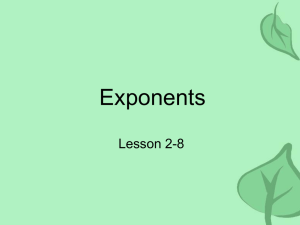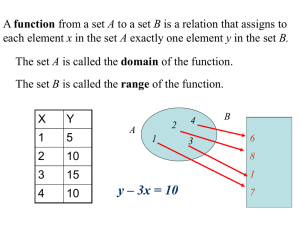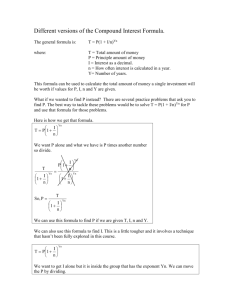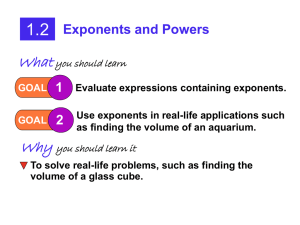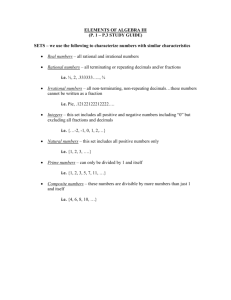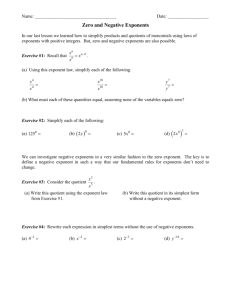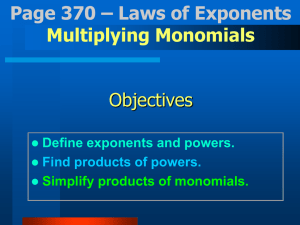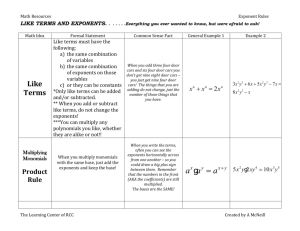Algebra 2 Chapter 5 Starter Worksheet
advertisement
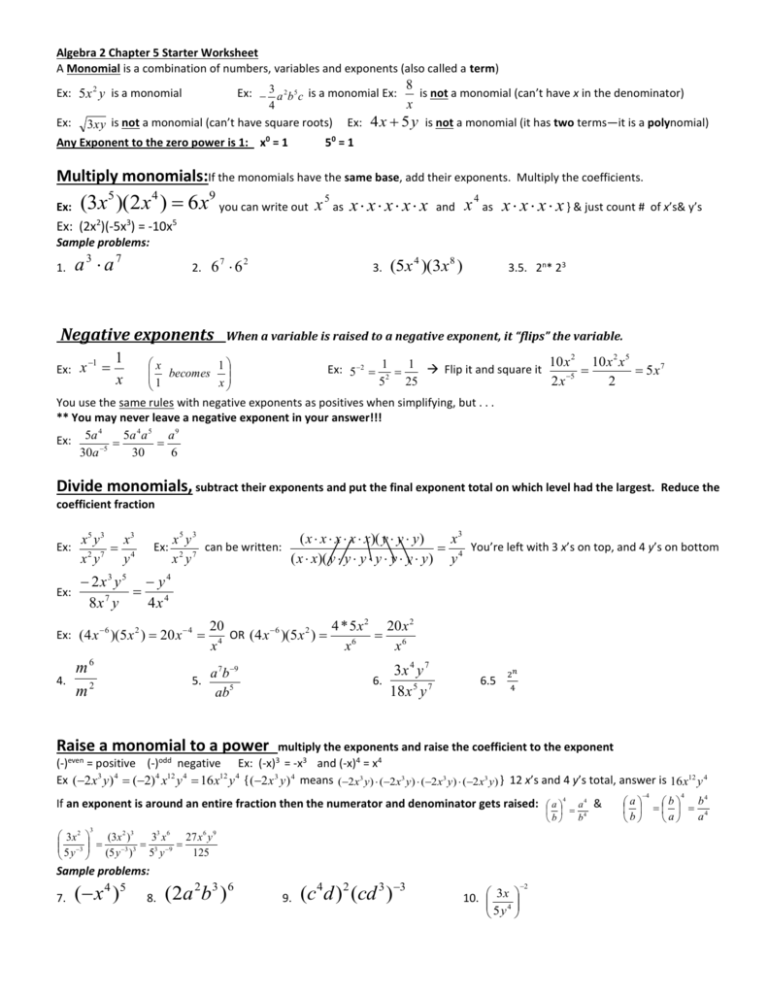
Algebra 2 Chapter 5 Starter Worksheet
A Monomial is a combination of numbers, variables and exponents (also called a term)
Ex: 3 a 2 b 5 c is a monomial Ex:
Ex: 5 x 2 y is a monomial
4
Ex:
3xy is not a monomial (can’t have square roots) Ex:
Any Exponent to the zero power is 1: x0 = 1
50 = 1
8
is not a monomial (can’t have x in the denominator)
x
4 x 5 y is not a monomial (it has two terms—it is a polynomial)
Multiply monomials:If the monomials have the same base, add their exponents.
Ex:
(3x )(2 x ) 6 x
5
4
9
you can write out
x 5 as x x x x x
and
Multiply the coefficients.
x 4 as x x x x } & just count #
of x’s& y’s
Ex: (2x2)(-5x3) = -10x5
Sample problems:
1.
a3 a7
2.
67 62
Negative exponents
3.
(5x 4 )(3x 8 )
3.5. 2n* 23
When a variable is raised to a negative exponent, it “flips” the variable.
1
x
2
2 5
10 x
10 x x
x
1
Ex: 52 1 1 Flip it and square it
5x7
becomes
5
2
1
2
x
2
5
25
x
You use the same rules with negative exponents as positives when simplifying, but . . .
** You may never leave a negative exponent in your answer!!!
4
4 5
9
Ex: 5a 5a a a
5
30a
30
6
Ex:
x 1
Divide monomials, subtract their exponents and put the final exponent total on which level had the largest.
Reduce the
coefficient fraction
Ex:
x5 y 3 x3
x2 y7 y 4
Ex:
2x3 y5 y 4
8x 7 y
4x 4
Ex:
( x x x x x)( y y y)
x3
x5 y3
can
be
written:
You’re left with 3 x’s on top, and 4 y’s on bottom
( x x)( y y y y y y y) y 4
x2 y7
Ex: ( 4 x 6 )(5 x 2 ) 20 x 4
4.
m6
m2
5.
20
4 * 5 x 2 20 x 2
6
2
OR
(
4
x
)(
5
x
)
6
x4
x6
x
a 7b 9
ab5
6.
3x 4 y 7
18 x 5 y 7
6.5
2𝑛
4
Raise a monomial to a power
multiply the exponents and raise the coefficient to the exponent
(-)even = positive (-)odd negative Ex: (-x)3 = -x3 and (-x)4 = x4
Ex (2 x3 y) 4 (2) 4 x12 y 4 16 x12 y 4 { (2 x 3 y ) 4 means (2 x3 y) (2 x3 y) (2 x3 y) (2 x3 y) } 12 x’s and 4 y’s total, answer is 16 x12 y 4
If an exponent is around an entire fraction then the numerator and denominator gets raised:
3
3x 2
(3 x 2 )3
33 x 6 27 x 6 y 9
3
3 9
3 3
125
5 y (5 y ) 5 y
Sample problems:
7.
( x 4 ) 5
8.
( 2a 2b 3 ) 6
9.
(c 4d )2 (cd 3 )3
10. 3x
5y4
2
4
a4
a
4
b
b
&
a
b
4
4
b4
b
4
a
a
2
Fraction Roots:
251/2 =
The Denominator of the fraction exponent is the root. a 3 3 a 2
Quick check of mental math without a calculator!
11. 3-2
12. (-5)2
13. (-x)101
14. 91/2
15. 16-1/4
2
25 5
Exponents, meet the exponents, They’re a common Algebra family
When you multiply like bases, You add the exponents
a3a4 = a7
When you divide like bases, you subtract the exponents
a5/a2 =a3
When you raise one to a power, you multiply the exponents
(2a2)3 = 8a6
When you have a negative exponent, you flip the location
ab-4/c-2 = ac2/(b4)
2324=27
35/32=33
(23)2=26
2-3 =1/8
When you have a fraction exponent, the denominator is a root
a2/3 =
31/2 =
a
Let’s see, when exponent is zero, then you always make the base one a0 = 1
2150 = 1
When you use the exponents, use them correctly, use them correctly, and you’ll get an A!!!!
3
2
3
Algebra 2 Simplifying Monomials Worksheet
Simplify each expression below:
16.
(5a 3 )( 4a 6 )
19.
(3 x 2 y 4 ) 3
(6 x 7 y ) 2
5
22.
m
26.
(2 x 4 y 2 ) 5
3
17. 4 x
5y2
4
8 3
20. 24 x y
8x 7 y 5
23.
3
( x y)
27.
2
6m 8 n 2
15mn 7
(6m 5 n 2 ) 2 (5m 7 n 3 )
18.
3
24.
21.
(5a 4 b) 2
(10ab 5 )(3a 3b 2 )
5
7
28.
(3xy 4 )( 2 x 6 y 2 ) 1
9x 4 y
3
4
(3x y )(5 x y )
25.
a 6 b 2
ab 3
